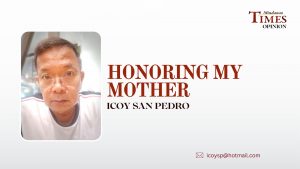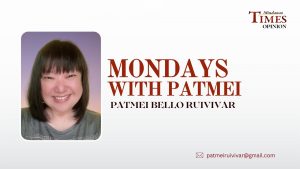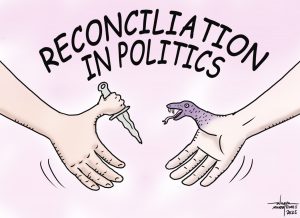By Herman M. Lagon
Think of a world where access to education could significantly influence the course of individuals and communities. Imagine a global initiative that offers everyone, no matter their economic status, the opportunity to gain important skills and knowledge. What kind of program would bridge education and employment, especially in under-resourced areas? Enter the concept of the Free University Microcredential International (UMI) Hybrid Program—a groundbreaking proposal designed to democratize education on an unprecedented scale and to champion social justice by making it accessible and free for all who wish to enhance their employability.
This innovative idea was formulated by a group of forward-thinking individuals, including the author of this column, during the Asian International Mobility for Students (AIMS) Summer Intensive Program held from August 1-8, 2024, at Hiroshima University, Japan. The program, supported by a JASSO scholarship, focused on higher education innovations, peace education, global collaboration, and internationalization. The “Happy Team” responsible for this proposal consisted of yours truly representing the University of St. La Salle-Bacolod and Iloilo State University of Fisheries Science and Technology; Indonesian Khairunisa Trie Suryaningsih from Tsukuba University, Japan, and Universitas Padjadjaran, Indonesia; Thai Korrawan Prakobsai, from Mahidol University, Thailand; Chinese Liu Hanyi, from Hiroshima University, Japan; and Cambodian Va Pharorng from the Institute of Technology of Cambodia. This team was one of six groups that pitched their higher education ideas at the AIMS Meeting at the Peace Memorial Hall in Hiroshima, attended by about 200 internationalization leaders from higher education institutions across Asia.
The heart of this proposal lies in the concept of micro-credentials. Micro-credentials are bite-sized, specialized certifications, or badges, pivoting on very specific skills or competencies. Unlike a traditional degree, which can take years to complete, micro-credentials are earned over a much shorter period of time, often just a few weeks or months. They are very result-oriented, target-bound, and laser-oriented to give exactly what the employers demand in today’s fast-changing industries. This makes them incredibly valuable in bridging the skills-employment gap that persists across the globe.
Most importantly, microcredentials are flexible. They can be quickly earned and are usually designed in a way that people can stack them together to earn larger credentials or degrees. This flexibility allows individuals to choose their own educative pathway based on their career goals, allowing them to make easier headway into a competitive job market. Furthermore, these microcredential programs hopes to be made available online, democratizing learning opportunities for the hitherto unconnected individuals where they happen to live.
Think about the story of Grace, a young single mom from one of the islands in Northern Iloilo. Born to poverty and therefore with limited educational opportunity, the prospects for Grace appeared dim in a region where 75% of the population is affected by skills gaps and 67% faces a skills-employment mismatch. But in the year 2026, Grace enrolled in the UMI Hybrid Program. She spent the next several years learning entrepreneurial ways, data analytics, and digital marketing—all skills in high demand within her community. By 2030, Grace was a respected professional and in 2032 completed her bachelor’s degree, greatly improving her job opportunities and contributing to the upliftment of her community. The success story of Grace is a testimonial to the new probability in life that a program like UMI (ocean in Nihonggo) can create.
The UMI Hybrid Program proposes to offer free outcomes-based ladderized micro-credentials addressing these critical skills gaps. The ambitious but easily doable objectives of the program will be to upskill and reskill the marginalized populations, make global online education accessible free of cost, support career advancement with credential stacking, and align higher education curricula with the current industry requirements. This is more than just a study initiative; it involves learning on an ongoing basis, inclusion, and gearing up for life in a VUCA world in preparation for the 5th Industrial Revolution.
Operationalizing such a program requires designing an operational, detailed action plan, which, in turn, would draw up the ways and means to organize a curriculum that will find it sagely how the said objectives of higher education could be dovetailed into. The curriculum must be focused on the outcomes, problem-research based projects, and 21st-century skills. It was an online, interactive learning platform accessible from across the globe and empowered by the best state-of-the-art advanced technologies: AI, AR, VR – all to make the learning process even more engaging. Digital badges and certificates will be awarded to mark academic and career progress in ways that ensure participants receive recognition that holds value within the job market. To support these efforts, investments in technology and sustainable practices would be crucial, as would partnerships with industry leaders and inclusive leadership practices.
Funding such a comprehensive program would require a multifaceted approach. Securing grants from industry partners, collaborating on co-funding initiatives, and seeking support from educational foundations and philanthropic organizations would be essential. Revenue could also be generated through paid certifications and premium services. Additionally, applying for government grants aligned with national development goals, engaging alumni and donors, and securing corporate sponsorships and advertising revenue could provide the necessary financial backing.
The timeline for implementing the UMI Hybrid Program would span over a decade, from 2024 to 2035, starting with a feasibility study and platform design, followed by testing, implementation, and continuous evaluation and improvement. This long-term approach would ensure that the program evolves in response to emerging needs and technological advancements.
The UMI Hybrid Program would not only address the immediate needs of those facing educational and employment challenges but also serve as a powerful tool for championing social justice. The best part is that with the universalization of this program, made equally accessible and free for all, we can pass a lifeline to those who need it most: those coming from underserved or marginalized communities. In a world where all too often educational inequities perpetuate cycles of poverty and unemployment, programs like UMI have the potential to finally disrupt the cycle and create pathways to prosperity for millions.
In closing, the Free University Microcredential International Hybrid Program represents a visionary leap towards an inclusive, sustainable, and impactful educational future. By addressing the gaps identified by global organizations, this initiative could empower millions, especially marginalized individuals like Grace, to thrive in a digital age. As we navigate the vast “ocean” of lifelong learning, the UMI Program could be the beacon that guides us towards a more equitable and prosperous world for all.
Is this the future of education? What if it were?
***
Doc H fondly describes himself as a ”student of and for life” who, like many others, aspires to a life-giving and why-driven world grounded in social justice and the pursuit of happiness. His views do not necessarily reflect those of the institutions he is employed or connected with.






